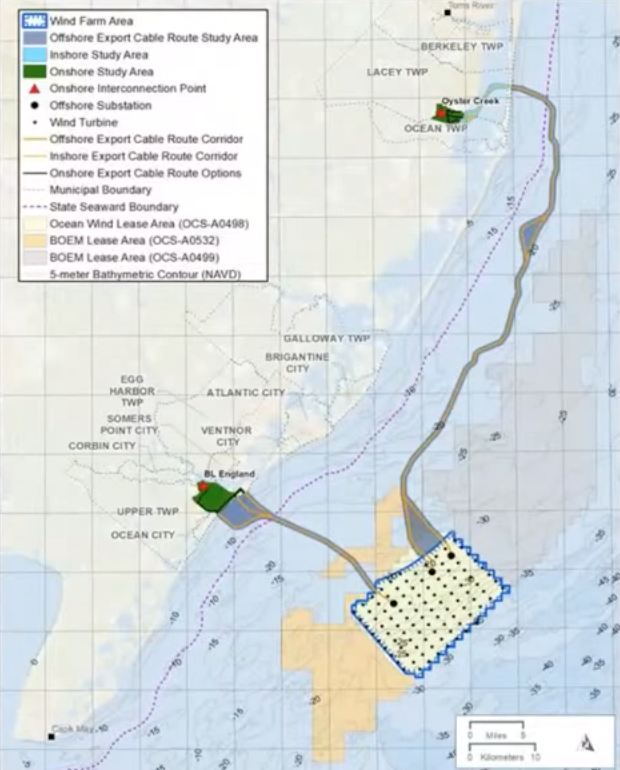The 45-day public comment period for a draft environmental impact statement on the proposed Ocean Wind energy project off southern New Jersey is “unreasonable and unjust,” the environmental group Clean Ocean Action said in a July 8 letter to the Bureau of Ocean Energy Management.
Based in Long Branch, N.J., Clean Ocean Action was first organized in the mid-1980s to fight ocean dumping off New York Harbor. Over the years the group played an important role in ending ocean disposal of treated sewage sludge and polluted harbor dredge sediments, and pushing for stormwater and litter pollution controls in the region.
Most national environmental groups have signed on to supporting the Biden administration’s ambitions to develop offshore wind. But Clean Ocean Action activists are alarmed by the speed and scale that the BOEM and wind developers envision for the New York Bight.
Clean Ocean Action describes itself as a “coalition of conservation, environmental, fishing, boating, diving, student, surfing, women’s, business, civic, and community groups with a mission to improve the water quality of the marine waters off the New Jersey/New York coast.”
In comments submitted July 8 to BOEM, the group contends setting a six-week public comment period for the Ocean Wind project off Atlantic City is “wildly unrealistic” with the range of issues and stakeholders that must be addressed.
The 1,100-megawatt turbine array planned by developer Ørsted would be the first project built off New Jersey, where state energy planners have ambitious plans for ocean wind power. There is opposition from seaside resort towns, the commercial fishing industry and some environmental groups like COA worried about what they see as industrialization of the ocean.
“The framework set forth by the National Environmental Policy Act provides that when an agency publishes a DEIS, the public must be provided a minimum of 45 days to review and comment on the document,” Clean Ocean Action says in its protest to BOEM.
“However, BOEM is not limited to this time period, which is wildly unrealistic, unjust, and poses undue challenges for all parties interested in providing thorough feedback on this unprecedented document and project. Indeed, providing only the minimum required public review and comment period, as well as the expedited fast- tracking process for offshore wind in general, suggests administrative bias toward the industry.”
BOEM has discretion to extend the period to 60 days, the group says. Already, “the extreme fast-tracking of the processes by which BOEM is conducting the offshore wind industrialization of U.S. waters is of great concern, particularly considering there has been no meaningful pilot scale projects from which to evaluate impacts of this industrial scale project,” the group says.
Ecological and impact assessment “are just beginning or still underway. Indeed, the number of streamlined and expedited reviews for offshore wind development is alarming, especially considering the economic and ecological importance of the ocean resources that will be affected,” according to COA.
The scale of the Ocean Wind draft environmental impact statement at more than 1,400 pages itself demands more time for public review, the group says.
“The public was ultimately afforded 78 days to review and comment on the DEIS for the Vineyard Wind OSW project off the coast of New England, even though that document comprised ‘only’ 478 pages,” the COA comment statement notes. “BOEM must ensure that the public has a commensurate amount of time to digest, research, and submit comments on this 1,400-page DEIS.”
“This timeframe for review is outrageous considering the unprecedented industrialization of both the ocean and Jersey coastline,” said Cindy Zipf, the executive director of Clean Ocean Action.
“In fact, the fast-tracking of due process as well as the speed, scope and scale of the industrial expansion in the region is reckless and suggests an unfair administration bias toward the offshore wind industry, instead of to the natural resources and ecological assets the ocean holds and which the government is entrusted to protect,” said Zipf.
Under the current public comment plan, three virtual online public hearings are scheduled by BOEM on July 14, 16 and 20 with final detailed comments due by 11:59 p.m. on Aug. 8




